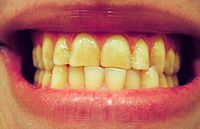
Photo from wikipedia
BACKGROUND Sleep bruxism (SB) is a condition regulated centrally, with a multifactorial etiology, which can occur secondary to systemic disorders and use of certain medications. OBJECTIVE The aim of this… Click to show full abstract
BACKGROUND Sleep bruxism (SB) is a condition regulated centrally, with a multifactorial etiology, which can occur secondary to systemic disorders and use of certain medications. OBJECTIVE The aim of this study was to identify associations between sleep bruxism, obstructive sleep apnea and hypopnea syndrome (OSAHS) and the use of antidepressants. MATERIAL AND METHODS In this cross-sectional study, 240 individuals underwent a full-night polysomnography, for medical reasons. Anamnesis was performed to collect data about the use of antidepressants and general health conditions. Polysomnography was performed to analyze sleep data and assess respiratory-related events and apnea and hypopnea index (AHI). The polysomnographic assessment of sleep bruxism was performed, from electrodes placed on masseter muscles and chin. SB was defined by the presence of more than two events of rhythmic masticatory muscles activity (RMMA) per hour of sleep. Statistical analyzes were performed to compare the presence of SB and AHI, severity of OSAHS and use of antidepressants. RESULTS There were statistically significant differences between bruxers and non-bruxers, when comparing AHI (48.28±25.84; p=0.001) and severity of OSAHS (p=0.015). Regarding the use of antidepressants, comparative analyzes did not shown correlations with bruxism (p=0.072). However, logistic regression suggests that the use of these medications may represent increased odds for SB development (OR=2.387; p=0.005). CONCLUSION The relationship between the use of antidepressants and SB remains inconclusive. SB is associated with OSAHS, mainly in its severe form. Therefore, identifying SB can raise the suspicion of the occurrence of other systemic disturbances.
Journal Title: Journal of oral rehabilitation
Year Published: 2022
Link to full text (if available)
Share on Social Media: Sign Up to like & get
recommendations!